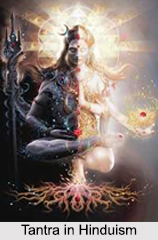 Tantra in Hinduism is a spiritual part of the religion. The concept of Tantra is closely associated with that of the concept of Hinduism. Tantrism aims to bring the hidden self in tune with the inner self and so as to make the individual in progress. The Tantra is considered the short cut method to self realization and spiritual enlightenment. The popular perception of Tantra among Hindus equate with black magic.
Tantra in Hinduism is a spiritual part of the religion. The concept of Tantra is closely associated with that of the concept of Hinduism. Tantrism aims to bring the hidden self in tune with the inner self and so as to make the individual in progress. The Tantra is considered the short cut method to self realization and spiritual enlightenment. The popular perception of Tantra among Hindus equate with black magic.
Origin of Tantra in Hinduism
Hinduism is typically related to Vedic concept but the Tantras are not a part of orthodox Hindu scriptures or Vedic scriptures. The Vedas of orthodox Hinduism lie on one side while the Agamas of Tantra on the other. However the tantric practices, mantras and the ideas of Atharva Veda are typically different from the other three Vedas. The Atharva Veda is cited by many tantra texts as the ancient source of knowledge. The Vedas progress throughout the Tantras such as Mahanirvana Tantra. Tantra exists for spiritual seekers at "Kali Yuga", when Vedic practices are not applicable in the daily lives. Tantra is the most direct means to realize the spiritualism. The Tantric thought according to Hindu, Tantra worship Lord Shiva and divine Mother Kali.
Concept of Tantra in Hinduism
In Hinduism, the Tantra typically takes the form of a dialogue between Shiva and goddess Shakti. Shiva is known as "Yogiraj" or "Yogeshwara", the "King of Yoga" or the "God of Yoga", while Shakti, his consort is considered as the feminine equal of Shiva. According to Hindu Tantrism, the entire universe is considered to be the divine stage where Shiva and Shakti carry on the drama of life. Tantra deals with ritual and spiritual practices to attain the grace of that Shakti, with the aim at achieving liberation from darkness of ignorance, thus also attaining immortality. There is a particular group of technique or philosophy to attain Moksha. Agamas mean Shiva to Shakti and Nigamas are Shakti to Shiva.
Tantra in Hinduism is the manifestation of early Hindu-Vedic thought and thus it embraces the Hindu Gods and Goddesses, especially Shiva and Shakti. It is also connected with Advaita philosophy or non-dualist Vedic philosophy that represents the ultimate aspect of Para Shiva or Brahman. These deities may be worshipped externally with flowers, incense, etc. These deities are more importantly used as the object of meditation, where the Tantric practitioner imagines the God or Goddesses and experience the Vision.
Tantra in Hinduism thus stands as a unique form of "Puja" where the deities invoked in a matchless way. The basic idea behind this Hindu tradition is that an individual must look for total control over themselves and the universe thereby getting aligned with the divine powers which leads to enlightenment.









